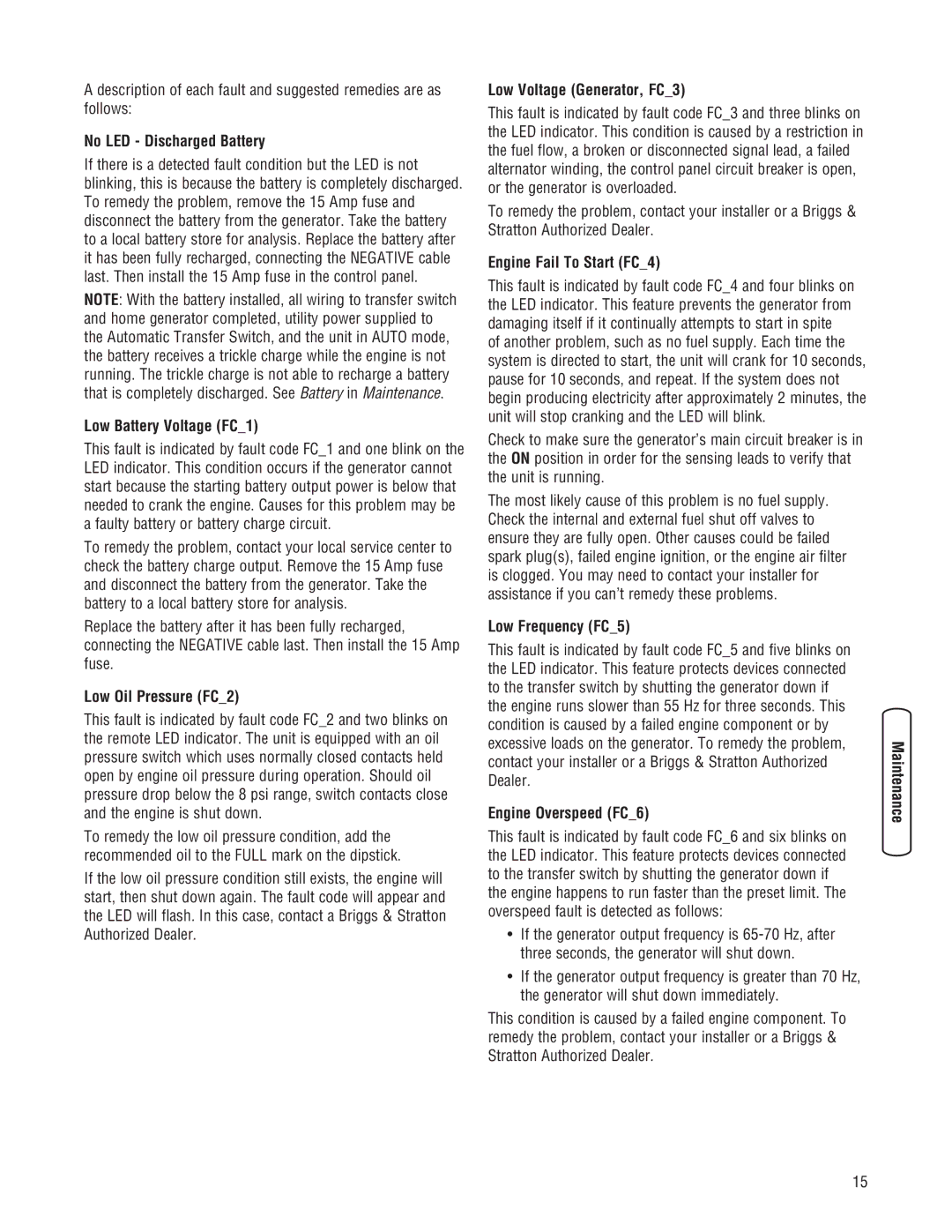A description of each fault and suggested remedies are as follows:
No LED - Discharged Battery
If there is a detected fault condition but the LED is not blinking, this is because the battery is completely discharged. To remedy the problem, remove the 15 Amp fuse and disconnect the battery from the generator. Take the battery to a local battery store for analysis. Replace the battery after it has been fully recharged, connecting the NEGATIVE cable last. Then install the 15 Amp fuse in the control panel.
NOTE: With the battery installed, all wiring to transfer switch and home generator completed, utility power supplied to the Automatic Transfer Switch, and the unit in AUTO mode, the battery receives a trickle charge while the engine is not running. The trickle charge is not able to recharge a battery that is completely discharged. See Battery in Maintenance.
Low Battery Voltage (FC_1)
This fault is indicated by fault code FC_1 and one blink on the LED indicator. This condition occurs if the generator cannot start because the starting battery output power is below that needed to crank the engine. Causes for this problem may be a faulty battery or battery charge circuit.
To remedy the problem, contact your local service center to check the battery charge output. Remove the 15 Amp fuse and disconnect the battery from the generator. Take the battery to a local battery store for analysis.
Replace the battery after it has been fully recharged, connecting the NEGATIVE cable last. Then install the 15 Amp fuse.
Low Oil Pressure (FC_2)
This fault is indicated by fault code FC_2 and two blinks on the remote LED indicator. The unit is equipped with an oil pressure switch which uses normally closed contacts held open by engine oil pressure during operation. Should oil pressure drop below the 8 psi range, switch contacts close and the engine is shut down.
To remedy the low oil pressure condition, add the recommended oil to the FULL mark on the dipstick.
If the low oil pressure condition still exists, the engine will start, then shut down again. The fault code will appear and the LED will flash. In this case, contact a Briggs & Stratton Authorized Dealer.
Low Voltage (Generator, FC_3)
This fault is indicated by fault code FC_3 and three blinks on the LED indicator. This condition is caused by a restriction in the fuel flow, a broken or disconnected signal lead, a failed alternator winding, the control panel circuit breaker is open, or the generator is overloaded.
To remedy the problem, contact your installer or a Briggs & Stratton Authorized Dealer.
Engine Fail To Start (FC_4)
This fault is indicated by fault code FC_4 and four blinks on the LED indicator. This feature prevents the generator from damaging itself if it continually attempts to start in spite of another problem, such as no fuel supply. Each time the system is directed to start, the unit will crank for 10 seconds, pause for 10 seconds, and repeat. If the system does not begin producing electricity after approximately 2 minutes, the unit will stop cranking and the LED will blink.
Check to make sure the generator’s main circuit breaker is in the ON position in order for the sensing leads to verify that the unit is running.
The most likely cause of this problem is no fuel supply. Check the internal and external fuel shut off valves to ensure they are fully open. Other causes could be failed spark plug(s), failed engine ignition, or the engine air filter is clogged. You may need to contact your installer for assistance if you can’t remedy these problems.
Low Frequency (FC_5)
This fault is indicated by fault code FC_5 and five blinks on the LED indicator. This feature protects devices connected to the transfer switch by shutting the generator down if the engine runs slower than 55 Hz for three seconds. This condition is caused by a failed engine component or by excessive loads on the generator. To remedy the problem, contact your installer or a Briggs & Stratton Authorized Dealer.
Engine Overspeed (FC_6)
This fault is indicated by fault code FC_6 and six blinks on the LED indicator. This feature protects devices connected to the transfer switch by shutting the generator down if the engine happens to run faster than the preset limit. The overspeed fault is detected as follows:
•If the generator output frequency is
•If the generator output frequency is greater than 70 Hz, the generator will shut down immediately.
This condition is caused by a failed engine component. To remedy the problem, contact your installer or a Briggs & Stratton Authorized Dealer.
15
